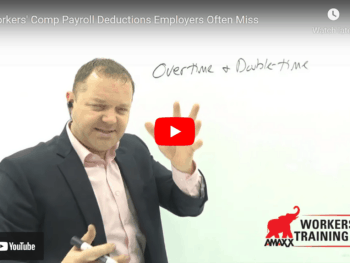Employers are generally required to purchase workers’ compensation insurance for their employees. To avoid this mandate, many employers simply classify someone as an “independent contractor.” Notwithstanding this simple classification, it can create many problems after the work injury occurs. Now is the time for employers and other interested stakeholders to understand the law, ramifications, and take corrective action if necessary.
Common Temptations
There are many ways employers can “avoid” obtaining workers’ compensation insurance that go beyond simply not buying the required insurance. Typical steps from employers can include:
- Incorrectly classifying someone as an independent contractor;
- Paying the party via 1099, and not a W-2 — required tax withholdings for employees; and
- Forcing parties to sign independent contractor agreements.
Courts have generally ignored these employment practices after a work injury occurs. The issue can also arise during an audit by a workers’ compensation insurance audit performed by a carrier. The bottom line is employers need to be responsible and ethical in their employment practices. If someone is an employee, buy the required workers’ compensation insurance, and at the same time, accurately report information on your payroll when applying and renewing your policy.
Click Link to Access Free PDF Download
“Workers’ Comp Claims Review Checklist: 9 Must-Have, Serious-Impact Elements”
Questions of “Control”
The court will generally look at the issue of “control” an employer has over someone when making a determination of the person is an employee. While the test may vary in each state, general factors to identify, and analyze control include:
- Maintenance of a separate business own office, and use of equipment, materials and other facilities: An independent contractor should not be headquartered within the employer’s usual place of business. Instead, they will have a separate office, and use their own equipment to perform job duties.
- Separate federal employer identification number, and the filing of business or self-employment income tax returns: Never believe that just because payroll taxes are not withheld make someone an independent contractor. If an independent contractor does not have a federal employer tax identification number, make sure they get one immediately.
- Contract to perform specific services for the person for a specific fee under which the individual controls the means of performing the services: A contract will outline the terms of service, so be careful to draft it in a way that does not take away the person’s job performance discretion – avoid control. Even by outlining a daily start/end time, and mandatory breaks can tip the scales in favor of someone claiming to be an “employee.”
- Expenses related to services required under the performance of the contract: Independent contractors will generally pay for all business expenses out of their own pocket. Once the employer starts paying for parts or materials to complete a job, the courts favor considering that person an employee. Independent contractors can still be reimbursed by the employer for these expenses during or at the end of a project.
- Responsibility for the satisfactory completion under the contract: An independent contractor is required to ensure completion of a project at their own discretion. This includes the ability to have a subcontractor (another party) perform the contracted services. Employers should protect themselves by requiring all parties obtain workers’ compensation insurance before entering the job site as some states allow for liability for workers’ compensation to flow to the employer.
- Receives compensation for the services performed under the contract on a commission, or per-job basis: Independent contract work is generally defined to specific work. Once the work becomes broad, courts will start to treat that person as an employee. Be careful! Paying someone an hourly wage generally signifies that person is an employee.
- Realization of a profit/suffer loss under the contract to perform services: Under this element, a party that is guaranteed to make money will be considered an employee. It is the element of “risk” undertaken by the party that separates employees from an independent contractor.
- Continuing or recurring business liabilities or obligations: Some independent contractor work may repeat itself. This allows for someone to work in the same manner if there is a new job once one is completed – similar to piecemeal work. Beware of situations where it ends up being the “show up tomorrow and we will find something for you to do.” That signals the person is an employee.
- Success or failure depends on the relationship of business: The element of risk is central to the analysis. Once this factor is removed, the party is generally considered an employee.
Conclusions
The use of independent contracts is essential for many businesses and industries. By using these persons to complete work projects, employers should not take advantage of not being required to purchase workers’ compensation insurance or avoid paying proper insurance premiums. Now is the time to review your employment practices and comply with the law to avoid future problems.

Author Michael Stack, CEO Amaxx LLC. He is an expert in workers’ compensation cost containment systems and helps employers reduce their workers’ comp costs by 20% to 50%. He works as a consultant to large and mid-market clients, is a co-author of Your Ultimate Guide To Mastering Workers Comp Costs, a comprehensive step-by-step manual of cost containment strategies based on hands-on field experience, and is founder & lead trainer of Amaxx Workers’ Comp Training Center .
Contact: mstack@reduceyourworkerscomp.com.
Workers’ Comp Roundup Blog: https://blog.reduceyourworkerscomp.com/
©2020 Amaxx LLC. All rights reserved under International Copyright Law.
Do not use this information without independent verification. All state laws vary. You should consult with your insurance broker, attorney, or qualified professional.




























